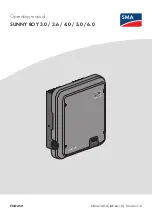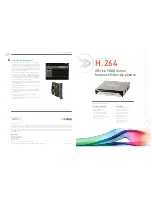
2 Safety
SMA Solar Technology AG
Operating manual
SBxx-1AV-41-BE-en-12
11
DANGER
Danger to life due to electric shock when touching live system components in
case of a ground fault
If a ground fault occurs, parts of the system may still be live. Touching live parts and cables
results in death or lethal injuries due to electric shock.
• Disconnect the product from voltage sources and make sure it cannot be reconnected
before working on the device.
• Touch the cables of the PV array on the insulation only.
• Do not touch any parts of the substructure or frame of the PV array.
• Do not connect PV strings with ground faults to the inverter.
DANGER
Danger to life due to electric shock in case of overvoltages and if surge
protection is missing
Overvoltages (e. g. in the event of a flash of lightning) can be further conducted into the building
and to other connected devices in the same network via the network cables or other data cables
if there is no surge protection. Touching live parts and cables results in death or lethal injuries due
to electric shock.
• Ensure that all devices in the same network are integrated in the existing overvoltage
protection.
• When laying the network cable outdoors, ensure that there is suitable surge protection at
the network cable transition from the product outdoors to the network inside the building.
• The Ethernet interface of the inverter is classified as "TNV-1" and offers protection against
overvoltages of up to 1.5 kV.
WARNING
Danger to life due to fire or explosion
In rare cases, an explosive gas mixture can be generated inside the product under fault
conditions. In this state, switching operations can cause a fire inside the product or explosion.
Death or lethal injuries due to hot or flying debris can result.
• In the event of a fault, do not perform any direct actions on the product.
• Ensure that unauthorized persons have no access to the product.
• Do not operate the DC load-break switch on the inverter in the event of ground fault
• Disconnect the PV array from the inverter via an external disconnection device. If there is no
disconnecting device present, wait until no more DC power is applied to the inverter.
• Disconnect the AC circuit breaker, or keep it disconnected in case it has already tripped,
and secure it against reconnection.
• Only perform work on the product (e.g., troubleshooting, repair work) when wearing
personal protective equipment for handling of hazardous substances (e.g., safety gloves,
eye and face protection, respiratory protection).
Summary of Contents for SB3.0-1AV-41
Page 111: ......
Page 112: ...www SMA Solar com...












































